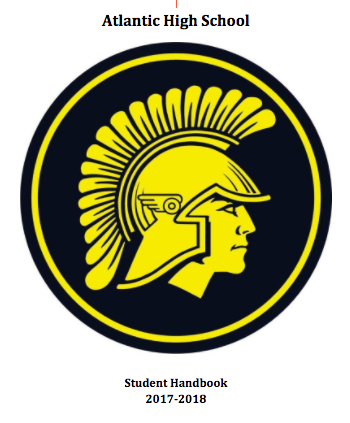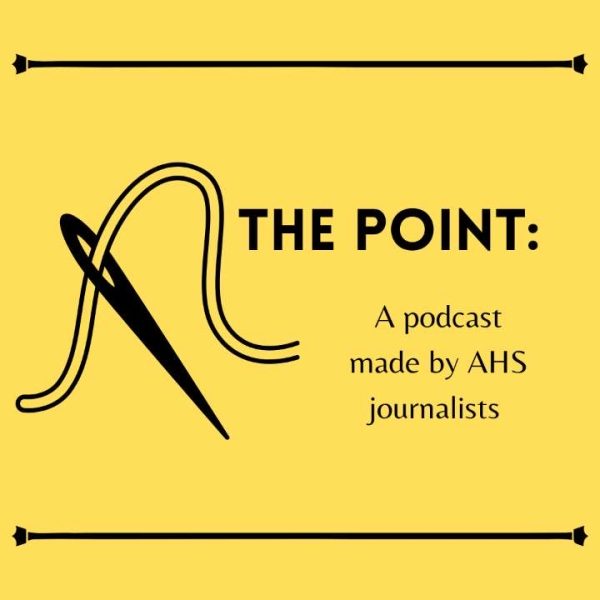Good Conduct Code Explained
Timely admission results in reduced punishments

The student handbook at Atlantic High School has recently become the topic of discussion throughout the halls. Students have questioned whether or not the consequences are followed equally for all.
Athletic director and assistant principal Matt Alexander wants to assure students the handbook is followed. “If you see something where (the student handbook) is not being followed, have a conversation with me. If you know of something where a violation has occurred, and someone is allegedly ‘getting away with it,’ let us know. It is maybe something we can investigate with law enforcement if they were involved.”
Alexander explained that there are no extenuating circumstances that would allow a student to have a more lenient punishment. The administration enforces the handbook rules at all times, he said, but they can only deal with what they know. “If the administration is not involved or notified by law enforcement, then we don’t know about it,” Alexander said.
GOOD CONDUCT POLICY EXPLAINED
The Good Conduct Policy has become the focus of students’ concerns. The policy includes three levels of violations: Categories A, B and C.
Category A offenses carry the most severe punishments, but these infractions are relatively rare at AHS.
Category B and C offenses are the ones that most frequently prevent students from participating in sports and other activities. According to the student handbook, a Category B offense is participating in any act that could cause a student to be arrested or given a citation in the criminal or juvenile court system and can be charged with a serious or aggravated misdemeanor, whether or not they were cited or arrested for committing the act. This includes the use, possession, or purchase of alcohol and “anything that is dangerous to the student’s health” such as huffing, the use of look-a-like chemicals, or over-consuming cough medicine.
If a student violates this rule, he or she will receive consequences of varying degrees depending on how many times the rule has been broken and whether that student is involved in athletics or activities. For the first offense, an athlete will miss 25 percent of the current sport or the next one they participate in within the next 12 months.
If in drama or speech, the student will be suspended from participating in the next performance or contest that goes on within the next 12 months. A band or vocal participant will be suspended for 25 percent of performances within the next three months. Extracurricular participants will miss the next two performances or contests that happen in the 12 months.
Second offenses carry increased punishments.
For both the first and second offenses, if the act occurred in the summer, it will be put into effect on the first day of school.
The third offense for a Category B offense will result in being suspended from all sports and other activities for the next 12 months.
For the current sports of football, volleyball and cross country, being absent from 25 percent of events would be two, three, and two games or meets respectively. A suspension of 50 percent of the season would cause a football player to miss four games, a volleyball player to miss six games, and a cross country runner to miss four meets.
CATEGORY C
Category C is the use, possession or purchase of tobacco products, regardless of the student’s age. Gross misconduct, which includes insubordination, misconduct, hazing, and harassment of others also are categorized as Category C. These result in the suspension of the next (one) contest for the first offense.
REDUCING THE PUNISHMENT
A participant can, however, lessen their punishment by timely admission. This means they notify the administration of their incident within their next day in attendance. By doing this, they will miss one fewer event than they were punished to. Timely admission may only be used once on the first violation of Category A or B.
If one student uses the timely admission clause and another doesn’t, the two may receive what appear to be two different punishments, when in fact the handbook has been followed in both cases.
STUDENTS NOT OUT FOR ACTIVITIES
According to Alexander, a student who does not participate in extracurricular activities, the punishment is slightly different. They will receive the same consequences from the handbook and their violation will be kept on their student record in case they decide to participate in an activity later in their school career. If they are never involved in an activity, they will not receive consequences through the school’s activities department. If the student repeats their behavior or it is serious enough they could possibly be suspended or expelled.
Alexander further elaborated on this section of the student handbook:
“Bottom line this is everyone’s school and we want to make sure that people are following the rules and doing what they need to do. Those that are not doing those things have consequences.”

You can find her hitting dingers for the Atlantic High School’s softball team as one of the best hitters in the state. You can find her “chilling”...







